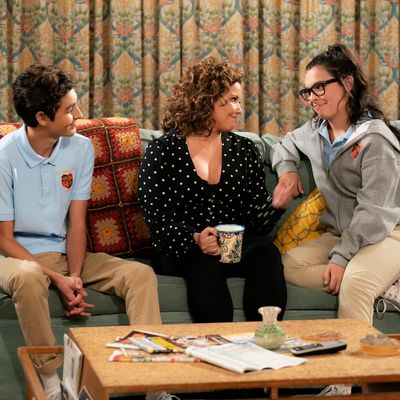
In another time, the return of One Day at a Time for its fourth season might feel like a triumphant TV event, maybe packaged with an interesting undercurrent of “let’s talk about the state of television right now.” The road to this fourth season has been bumpy. After three critically lauded seasons but likely low audience numbers, the series was canceled by Netflix, which did so with a thread of unfortunate, tone-deaf tweets. Then there were months of limbo until the show was revived by PopTV, an outlet in the United States known mostly for being the home of Schitt’s Creek.
At another moment, the show’s fourth season would have felt like a referendum on the pitfalls and weaknesses of Netflix’s streaming model, an experiment in what happens when a show originally designed for streaming is retooled for weekly TV running on a traditional scheduling grid. But right now, the return of ODAAT is a referendum on something else — it’s about TV’s capacity to help us process our deepest anxieties about the world.
First, a few words on what this review might’ve been about a month ago: If ever there was any concern that the switch from Netflix to PopTV might make the show feel different, or that something essential about the warm family sitcom had been lost in the transition, the first three episodes of the season that were provided early to critics should put any fear to rest. They are just as delightful and life-affirming as ODAAT has always been. If anything, because the episodes are a bit shorter to fit inside a traditional TV half-hour slot rather than a streaming service’s free-for-all, the show is a touch better. It’s tighter, and the jokes land faster. I do miss the full-length theme song, which has been cut down to a short bumper, but otherwise, it is still the show I have always loved.
We don’t watch TV in a vacuum, though. One Day at a Time will be returning for its fourth season in the middle of the coronavirus pandemic, when a huge majority of its viewers will be operating under social-distancing procedures, shelter-at-home requirements, or, at the very least, enormous clouds of anxiety. So it’s worth pointing out two things that are simultaneously true about ODAAT: It is an especially good show for a time when the world is full of frightening unknowns, and the reason that’s true is because ODAAT is the same as it’s always been.
You can parse the program’s central DNA in a lot of different ways. It’s a revival of a series from the ’70s, and it’s a classic three-cam sitcom, and it’s a story about a Cuban-American family, and (vitally) it’s a vehicle for us all to appreciate Rita Moreno. But from the beginning, it’s been a series that takes serious social and political issues and filters them through the experiences of one family. Like All in the Family and The Jeffersons, it’s a Norman Lear sitcom, which means it’s a platform for watching a family process the world. On ODAAT, those issues so far have included depression, immigration, financial stress, coming out, toxic masculinity, and PTSD.
None of those issues are pandemics; the show began work on this season several months ago, so if you’re hoping it will be a mirror that reflects the world, there’s going to be some inevitable lag time. But that delay doesn’t matter very much. There’s something extremely poignant and comforting about the show even when the issues early in season four feel like nostalgic, hilariously minor concerns. (For instance, the Alvarez family is struggling with the fact that for the first time in her life, Penelope (Justina Machado) actually has more money than she’s used to.) The central idea of it still hits me in the solar plexus: It’s a show about a family constantly trying to grapple with global realities.
Every episode is some mix of the personal and the immense. In the very smart season opener, which airs tonight on Pop, Ray Romano guest-stars as a census taker, and Penelope immediately bristles at the idea of giving personal family information to a government agency. Elena quickly jumps in, schooling Penelope on how crucial it is for every family to be counted accurately. It’s a sweet little scene to start the new season, a bit of current events combined with a well-known guest star, with the census-taking doing double duty as an opportunity to introduce the Alvarez family members to the show’s potentially new audience on PopTV. But because it’s the kind of thing One Day at a Time has always done, the on-the-nose topicality doesn’t feel strained. This is business as usual for this show.
All of this is what makes ODAAT feel so remarkably soothing, even at a time when it’s addressing news that feels several months out of date. The engine isn’t processing the thing we’re worried about right now, but it’s still an anxiety-processing machine. It’s a system for taking giant, scary things, often so massive that they feel beyond our ability to impact as individuals, and turning them into personal, meaningful, helpful stories. I’ve always found the title of this show a little trite, but now it’s a perfect description of all our lives.


